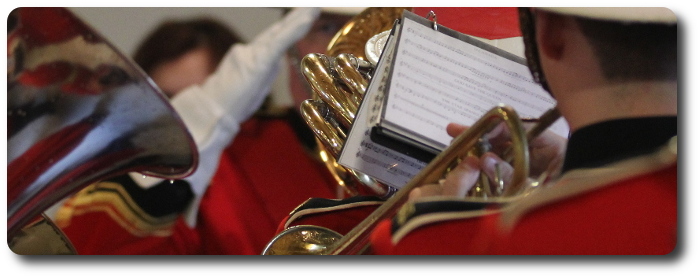Topic: Martial Music

Pitch in Army Bands
The Glasgow Herald, 19 August 1927
Though the musical public in general are probably unaware of it the question of pitch in Army bands has for long been a vexed one, and the majority of those interested had probably given up all hope of seeing the day when the bands would bring themselves into line with the other musical activities of the country by lowering their pitch. At last something is to be attempted, and all those who know the troubles and disadvantages of the existing situation will hope earnestly that something will also be done. Meantime it is interesting to note that we have learned of this now from Kneller Hall, the famous training school for all British Army bands, but from the "Ceylon Observer" of July 26 which gives a long and interesting account of the whole history of the matter, written by Major W.G. St. Clair. The author has fought long and zealously for this reform, and he, no doubt, penned the last of his sub-titles "The End in Sight," with a thrill of real pleasure.
Despite its supreme importance the question of a standard pitch for all music has only comparatively recently been solved. It is pretty clearly established by deduction that pitch in the early days of our music varied not only in different places but with different classes of music. From the fifteenth to the seventeenth centuries the general pitch gradually fell. From the beginning of the eighteenth to the close of the last century it rose steadily. The cause of this rise was the increasing importance of wind instruments. They fix the pitch of orchestral compositions, and the growing demand for louder and more existing effects in music led the manufacturers to build for brilliance. The consequence was that singers were often required to face unnecessary difficulties, and the effect of music in general was falsified to a considerable extent. The importance of the question may be gauged from the instructions issued by the French Government in 1868 to a commission of inquiry: "The constant and increasing elevation of the pitch presents inconveniences by which the musical art, composers, artists, and the musical instrument makers all suffer, and the differences existing between the pitches of different countries, of different musical establishments, and of different manufacturing houses is a source of embarrassment in musical combinations and of differences in commercial relations." The pitch recommended as a standard (A-435.4 vibrations at 59 degrees Fahr.) is the one now adopted by all music-makers with one glaring exception—our British Army Bands.
The story of it all, as told by Major St. Clair, is not without its amusing side. It seems that; long ago, Queen's Army Regulations had decreed that the pitch of our Army Bands was to conform to that of the Philharmonic Society of London, which at that time was high. On November 6, 1896, the Society lowered the pitch to the accepted "diapason normale," but unfortunately, though, no doubt quite innocently, they omitted to tell the War Office that they had done so. Since 1896, therefore, the Army bands have been using a higher pitch than the Philharmonic Society in defiance of the regulations. Writing in 1899, Major St. Clair, with a touch of gentle satire, christened the high pitch to which the War Office so fondly clung, the "Kneller Hall Pitch." Two years later, copies of the Major's article found their way to Kneller Hall, the King's Regulations recognized the anomaly of the situation and ordained that "in order to ensure uniformity throughout the Bands of the Service the instruments are to be of the pitch known as the Kneller Hall Pitch." No one would accuse our War Office of a sense of humour, so we must suppose that the authorities thought they were doing well.
The turning point came with the appointment of Colonel J.G. Somerville as Commandant of Kneller Hall/ At the annual conference of the British Music Society in 1920, when a whole day's discussion was given to the question of a standard pitch, Colonel Somerville pledged himself to do all in his power to bring the Army bands down from their high pitch, and he is fulfilling his words in many ways. A letter of his to "The Times" attracted the attention of a "very influential person," and "as a direct consequence of this," he says in a recent letter to Major St. Clair, "an item was put into the Military Budget of a first instalment for the conversion of the pitch." There is no doubt, as he says, that this will be "axed" by Treasury, but he gets comfort from the thought that it will continue to be brought forward automatically year by year till actioned. Major St. Clair is not inclined to wait in patience "till the Greek Kalends of normally balanced Budgets and satiated Labour," and has already written to London. The difficulty is, of course, financial. Madame Patti recognized this by giving a cheque for £500 to provide the orchestra at Covent garden with low-pitched instruments, having previously told Sir Michael Costa "that she would neither rehearse nor perform unless the pitch was reduced to that of the Continental operas." The outlay necessary to recondition the Army bands will be much more than that, but it will still be a comparatively small item in the Army Estimates. It is depressing to think that if the change had been made at a proper time the process would have been very much cheaper.

